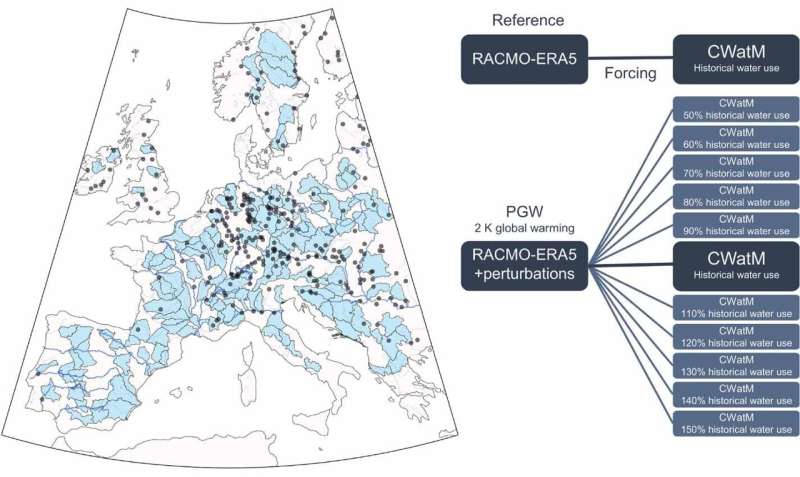This article has been reviewed according to Science X's editorial process and policies. Editors have highlighted the following attributes while ensuring the content's credibility:
fact-checked
peer-reviewed publication
trusted source
proofread
Challenges ahead: Navigating climate change and water management

Water availability is limited, and several socio-economic sectors compete for the available water resources. Consequently, water withdrawals often take place at the expense of environmental flows, leading to loss of biodiversity and depletion of groundwater resources.
Across Europe, about two-thirds of abstracted freshwaters comes from rivers and streams, and water availability shows a clear North-South divide. Northern Europe has a lot of water, while Southern Europe has less water in its rivers and it is limited by the seasons. This difference is becoming stronger due to global warming and the trend is expected to continue. This will impact droughts and low flows, which are the smallest amount of water that flow in a river, for example, for about a month each year.
"Several studies have evaluated the potential impact of climate change on low flows in European rivers. However, these studies do not consider the role of changing water management on future low flows. In our study, we investigated how climate change and altered water withdrawals impact low flows in European rivers," explains Peter Greve, lead author of the study and a researcher in the Water Security Research Group of the IIASA Biodiversity and Natural Resources Program.
"We found that changing water withdrawals largely influence low flows in Western and Central Europe. Even small changes in water withdrawals in various Central European rivers can have a more significant impact on low flows than just the effects of climate change," says Taher Kahil, Water Security Research Group leader and co-author of the study.
This study provides the first assessment to systematically disentangle the combined impact of climate change and changing water withdrawals. The researchers also utilized a unique approach by forcing the Community Water Model (CWatM) with the so-called "pseudo-global warming experiments." In these experiments, scientists simulate how the weather might have been in certain areas in the past if the entire world had been warmer by 2°C.
"Our findings emphasize the chance to tackle climate change effects on river flows, particularly during the driest time of the year. Rivers highly responsive to water withdrawals can gain most from coordinated actions to decrease withdrawals at regional, national, and international scales," says Greve.
"An increased frequency of low flows can have negative impacts on river navigation and hydropower generation. Additionally, decreasing water quality associated with low water levels could exacerbate the degradation of river ecosystems urging for a continued and more rapid implementation of measures to increase low flow levels in the most affected rivers."
The researchers reiterate that future river flows, particularly low river flows, are not just impacted by climate change, but need to be assessed under global change. This should include socio-economic changes, such as future population growth, increasing food demand, and economic development.
"Including water withdrawals in hydrological assessments is paramount to communicating the uncertain evolution of future river flows. We urge a routine consideration of water management in future projections of river flows," concludes Kahil.
The study is published in the journal Environmental Research Letters.
More information: Peter Greve et al, Low flow sensitivity to water withdrawals in Central and Southwestern Europe under 2 K global warming, Environmental Research Letters (2023). DOI: 10.1088/1748-9326/acec60
Journal information: Environmental Research Letters




















